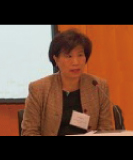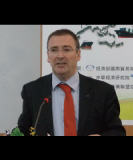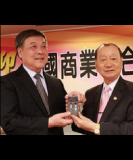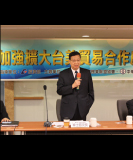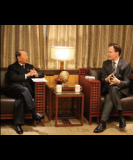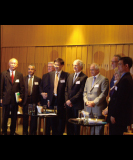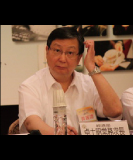You are browsing > Service Trade > Trade Info
“Bali is just the start” — AzevêdoWTO News Center
Introduction
Madam President of the Assembly of the Republic,
Minister of State and Foreign Affairs,
Former President of the Republic, Jorge Sampaio
Members of the Portuguese Government,
Ambassadors,
Ladies and gentlemen,
I am delighted to be in Lisbon, and to have the chance to address such a distinguished audience here, in a place that is so symbolic of Portuguese democracy.
Of course, being Brazilian makes the pleasure even greater — speaking in Portuguese at an official event is a rare privilege, to say the least.
But the privilege also involves the chance to revisit a land which, aside from its mystique, is also a point of reference for all Brazilians. I can assure you all that, in my personal experience (as a Brazilian whose blood is 7/8 Portuguese), it is impossible to understand the Brazilian soul without visiting the roots and common origins of our people — people in the singular — distributed on both sides of the Atlantic.
Before embarking on the topic of our meeting here today, I feel compelled to share with the Portuguese nation my profound sadness and solidarity following the passing of Eusébio. As I think everyone knows, I'm a football fanatic, and it was very sad to receive the news when I disembarked yesterday in Lisbon. Eusébio — our “Black Panther” — was a sportsman and human being who always aroused feelings of admiration and inspired millions around the world. At least we have the consolation of being able to relive his great moments with images that will doubtless be relayed by television worldwide. He will remain forever in the annals of history as one of football's giants.
To get back to the route map of our conversation, just over a year ago I announced my candidacy for the post of Director‑General; and I was here in Lisbon at the start of last year, still in the early stages of that selection process. What I saw and heard here encouraged me to pursue the position of Director‑General, and I'm very grateful for the guidance and wise advice that was offered to me. These last 12 months have been truly eventful and testing.
I want to thank the Portuguese Government for the tremendous support you gave me throughout my campaign for this role — and, particularly, for the support that you, along with the EU as a whole, gave to achieving a successful outcome in Bali.
My presence as the head of the WTO and the success of the Bali negotiations were a direct outcome of that support. We now need to build new negotiations and multilateral outcomes on the foundations which we have just jointly signed up to in Bali.
This new endeavour is precisely the topic of my talk this morning, which has the title “Trade multilateralism in the twenty‑first century.”
While today I can speak more optimistically about this topic, just six weeks ago that would not have been the case.
Before the gavel finally came down to confirm the adoption of the Bali Package, the future of trade multilateralism was in doubt.
But the gavel did come down on the deal — we delivered. And it has changed the outlook and the opportunities quite dramatically.
I remember that, just one week from the start of the Ministerial Conference in Bali, we closed the negotiating process in Geneva with texts that were still unfinished. We were a step away from another failure; and, in my opinion, only one factor could reverse that situation and bring us to a positive outcome in Indonesia.
To use a buzzword that is well‑known in diplomatic spheres, what was required was “political will”. In practical terms, what we really needed and the only thing capable of ensuring that that “political will” materialized, was a collective awareness that:
(1) the agreement being pursued was desirable for everyone and, above all, doable for everyone;
(2) a positive outcome would not produce winners and losers, nor a north‑south divide (both developed and developing countries would need to work for the agreement);
(3) the multilateral trading system needs to be reinvigorated to benefit everyone, particularly the smallest countries and those with least capacity to manage the intricacies of large‑scale trade negotiations.
In my opinion, the fact that this set of elements was present in Bali is what enabled dynamic and innovative procedures that led us to finalize the texts, without the traditional closed‑door negotiations with a small number of delegations around a single table. The process was inclusive and transparent to the last.
Clearly, aside from the systemic impact and its symbolic dimension, the Agreement was only possible on the basis of what was on the table. That had to be the starting point and the central underpinning of the “political will” we were looking for. In fact, the Bali Package involved a large number of measures that are very important for all Members. It covered three important areas, and I'll take each one in turn.
The Bali Package
The first pillar is Agriculture. This is the cornerstone of the Doha Development Agenda which the WTO has been working on since 2001. Agricultural issues are very dear to developing countries, and the Bali Package delivered some important outcomes.
For example, it sets us on track for a reform of export subsidies and measures of similar effect, and it makes practical progress towards better implementation of the tariff quota commitments assumed in the Uruguay Round. There is also a reaffirmation and a deepening of the political commitments assumed in Hong Kong on trade liberalization and the reduction of distorting support to cotton — a very important issue for the African countries that grow that crop.
The Package also provides temporary protection for food security programs in developing countries, which allow for the stockpiling of grain for subsequent distribution to the poor. As we know, some of those countries could be exposed to legal challenges in the WTO for exceeding the limits stipulated in the Agriculture Agreement for certain types of domestic support. So, in addition to the temporary protection against legal challenges, the Bali Agreement states that a permanent solution will be negotiated and concluded before the 11th Ministerial Conference in four years' time.
The second pillar of the Package is Development.
Here, a monitoring mechanism will provide for the review and strengthening of special and differential treatment provisions for developing countries, which are contained in all WTO multilateral texts. This achievement is vital for the equilibrium and efficacy of the multilateral system.
There are also a number of specific measures to support the Least-Developed Countries.
They include reforms that would enable services providers in LDCs to enjoy new export opportunities in developed country markets.
They also include steps to simplify rules of origin, which again will open up new export opportunities for those countries specifically.
Under this pillar we will also see improvements in trade preference arrangements which extend exemption from tariffs and quotas to LDC exports.
The third and final pillar is Trade Facilitation, which sets out to simplify and modernize customs procedures, and make them more transparent, thereby reducing transaction costs. The Agreement on Trade Facilitation will be able to provide a significant — and today much‑needed — boost to the global economy, delivering growth and jobs. This could be worth up to $1 trillion per year to the global economy — generating up to 21 million jobs.
Significantly the Agreement also ensures the provision of technical assistance to support developing economies and the least-developed economies to implement these modernizing reforms, and therefore help them integrate better into global trade flows.
Clearly estimates can vary, but, once the Agreement is implemented, there could be an expansion in developing country exports of up to 10% — compared to a 4.5% expansion in developed countries.
It is true that the deal represents only part of the Doha Development Agenda. But there can be no doubt that this is a significant package that will provide a considerable economic boost and improve the lives of millions of people around the world — particularly among the poorest and in countries whose economies have stalled and are suffering high levels of unemployment.
In the specific case of the European Union and its member States, the conclusion of the Bali Package reflects that grouping's chief negotiating objectives. With the Agreement on Trade Facilitation, opportunities for expanding trade will clearly increase. The Agreement also offers potential to facilitate the internationalization of small and medium‑sized enterprises, which are important drivers of job creation and income distribution in many European countries.
The importance of the Multilateral Trading System
But of course these outcomes do not fully reflect achievement of Bali.
There was a great deal more at stake.
I said at the start of the Bali Conference that the very future of multilateral trading system hung in the balance.
Ministers needed to be warned that the consequences of failure were very real for us all. And they responded positively, demonstrating the flexibility and political will needed to cross the finishing line. And by doing so they also clearly showed the importance that they attach to the system.
In recent months there has been a lot of talk about regional and bilateral agreements. The Transatlantic Trade and Investment Partnership is one such potential agreement — and I know this is the subject of a panel session during today's seminar. My view of this is the same as of other potential agreements of this kind: it is a positive initiative to be welcomed - but it can only ever be one part of the wider picture. Agreements such as this cannot be sufficient on their own to ensure globalizable gains. The proliferation of regulations and standards tends to multiply costs rather than reduce them.
As we all know, the multilateral trading system was never the only option for international trade negotiations. It has always co‑existed with, and benefitted from, other initiatives — whether regional or bilateral. They are therefore not mutually exclusive alternatives.
The WTO disciplines also need to evolve to reduce the gap that will exist between multilateral regulations and the new generation regulations negotiated outside Geneva. The two processes, multilateral and bilateral, must move forward together to reduce costs effectively and to curb protectionism. Otherwise, we could see results that are exactly the opposite of what we are seeking.
Nor should we forget the systemic effects that will be felt if non‑multilateral undertakings become the sole negotiating channel. We would then have a major problem both in terms of asymmetry of the agenda and the issues covered.
In such fora the Least-Developed Countries tend to lag behind or, worse still, get excluded from the negotiating table. Moreover, the agenda is inevitably limited and neglects issues that are critical for the global trade agenda such as agricultural subsidies.
In addition, many of the deals that are currently being discussed ignore the most important and dynamic frontier of international trade: the big emerging players.
The emergence of these new players is one of the central facets of the evolution currently taking place in global trade and global governance mechanisms.
And the multilateral trading system assumes even more critical importance given the fragility of growth in the global economy. Economic conditions have generated protectionist pressures in some areas.
Our most recent trade report for the G‑20, published in December, found that trade restrictions are on the rise, with 116 new trade restricting measures being identified over the preceding six months.
Furthermore, the global economy is evolving rapidly and dramatically in other key areas, such as:
shifts in trade patterns (South-South trade, for example, is growing at unprecedented rates);
shifts in production and consumer behaviour (private sector standards and concerns with impacts on climate, environment, human health, etc);
ongoing technological innovation; and
the further internationalization of supply chains (cross‑border aspects tend to intensify as transport and communications become faster).
Both trade and the international economy are evolving — and the multilateral system is the only system that can truly and adequately respond to the challenges that are appearing on several fronts. So we need to consider how it can continue to deliver in the years ahead.
Lessons from Bali
I believe the Bali package provides some useful lessons to this end — not just through the substance and the strong reaffirmation of Ministers' commitment to the Doha Development Agenda — but also through the procedures we adopted which led us to success in Bali.
First, we needed to be creative. We knew that, in the short run, we were not in a position to conclude the Doha Round in full and by the route we had been pursuing - that much was acknowledged at the 8th Ministerial Conference held in Geneva in 2011. A reality check enabled us to look at areas that were promising and doable; and this enabled us to design the general outline of what would emerge as the “Bali Package”.
Second, an important point is that the process had to be transparent and inclusive at all stages. Instead of small groups of countries negotiating in closed rooms, the entire membership came together to negotiate in open‑ended meetings. It was not an exclusive club that was deciding everything.
Where smaller meetings were held, the attendees varied according to the issue. What mattered was not the size of the country but the degree of sensitivity on the issue in question. The results of those smaller‑scope conversations were immediately taken to the broader group of Members. Although it was a slow and painstaking process, it was essential to give all Members ownership of the package and the outcomes.
Lastly, we sought a balanced package that everyone could support. The traditional divide between developed and developing countries, between north and south, was not present in this package.
Clearly, perceptions frequently differed on the various issues, but all parties perceived gains when the package was viewed as a whole.
The developing nations fought for the package just as hard as anyone. The few voices that expressed reservations about the general balance of the agreement and suggested it should be rejected found no echo in the developing world. Bali changed the ballgame — we have put the “World” back into the “World Trade Organization”.
Post‑Bali
We now have a ministerial mandate to look anew at core Doha Round issues and to develop a viable new approach. I think these lessons will help us make further progress.
I listened very carefully to Ministers on this topic in Bali; and a number of suggestions were floated there. Although they vary widely in content and emphasis, all need to be considered carefully and discussed among Members.
Nonetheless, certain elements seem to be essential for our future work, whatever path we follow, and I will now make a brief and non‑exhaustive list of them.
(1) We must be ready to be creative and keep an open mind to new ideas. We need to be prepared to recognize the most urgent challenges and priorities of the modern world, without ignoring the negotiating mandates.
(2) We cannot forget that development has to be preserved as the central pillar of our efforts.
(3) We need to explore new ways of making headway on the most difficult negotiating topics. We might even conclude that there are no prospects for progress in those areas, and that we need to seek other negotiating paths. But we mustn't be afraid of that discussion or shy away from it.
(4) We need to be realistic. One of the critical factors for success in Bali was respect for the limits of political viability when defining the negotiating targets.
(5) Our efforts need to be given a sense of urgency. Rapid changes are taking place in the world, in the business, political and cultural domains. The trade agenda is no longer confined to tariff reduction. Today the regulatory dimension, particularly within national territory, is just as important as what happens strictly on the border, or even more so. The system cannot take two or three decades to respond to those changes; it needs to act much more swiftly.
Conclusion
The task of strengthening the multilateral system and moving towards delivering on the DDA will be difficult — but it is not impossible.
Many didn't believe we could deliver in Bali, and with good reason. But we did — and we can do more. Bali is just the start.
As I said at the beginning of my remarks, just six weeks ago the fate of the multilateral trading system hung in the balance. Today we can talk with confidence about how we can continue to develop and strengthen the system for the future.
And when we look to the future, I think it's also useful to look to the past.
We should recall the reasons why the GATT was created, leading to the WTO as we know it today.
The birth of the GATT was intimately associated with post‑war ideals. A lasting peace would only be possible with balanced and fair global economic growth, without winners and losers. International political cooperation was imperative, clearly associated with closer and more objective international economic cooperation. The peaceful and cooperative integration of peoples thus depended on greater integration and cooperation among countries in international trade.
Clearly, countries will not sacrifice their national interests for the multilateral system, nor could we ask them to do so. Nonetheless, the WTO cannot lose sight of those fundamental principles. There is plenty of room for convergence between defending national interests and improving the multilateral trading system.
I think I've talked for long enough. I know I've not identified the road ahead, but I hope I've given food for thought. We will need creativity and open minds in Geneva.
Portugal, as a tireless partner of multilateralism, with its efficient and highly reputed diplomatic corps and its aptitude for brokering understanding in international fora, has much to contribute to our joint reflection.
In my Cabinet, I receive close and always very wise counsel from Ambassador Graça Andresen Guimarães, and I'm grateful to the Portuguese Government for providing me with such indispensable support.
To conclude, let me once again thank the Portuguese Government, through the Minister of State and Foreign Affairs, for inviting me to address this distinguished assembly. I hope the work of this two‑day seminar will be useful and fruitful.
I wish you all a Happy New Year!
Thank you.

